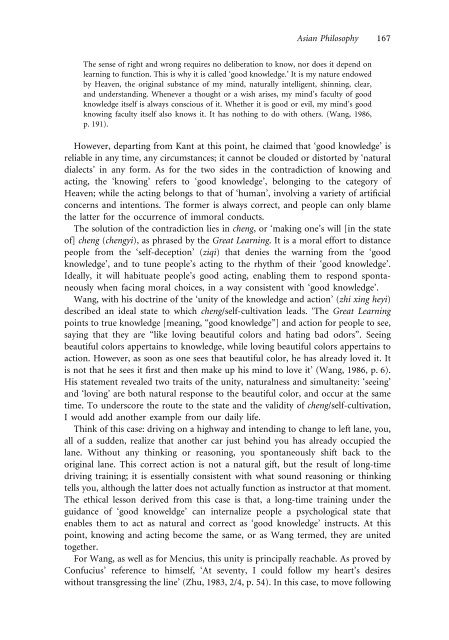Western sincerity and Confucian Cheng
Create successful ePaper yourself
Turn your PDF publications into a flip-book with our unique Google optimized e-Paper software.
Asian Philosophy 167<br />
The sense of right <strong>and</strong> wrong requires no deliberation to know, nor does it depend on<br />
learning to function. This is why it is called ‘good knowledge.’ It is my nature endowed<br />
by Heaven, the original substance of my mind, naturally intelligent, shinning, clear,<br />
<strong>and</strong> underst<strong>and</strong>ing. Whenever a thought or a wish arises, my mind’s faculty of good<br />
knowledge itself is always conscious of it. Whether it is good or evil, my mind’s good<br />
knowing faculty itself also knows it. It has nothing to do with others. (Wang, 1986,<br />
p. 191).<br />
However, departing from Kant at this point, he claimed that ‘good knowledge’ is<br />
reliable in any time, any circumstances; it cannot be clouded or distorted by ‘natural<br />
dialects’ in any form. As for the two sides in the contradiction of knowing <strong>and</strong><br />
acting, the ‘knowing’ refers to ‘good knowledge’, belonging to the category of<br />
Heaven; while the acting belongs to that of ‘human’, involving a variety of artificial<br />
concerns <strong>and</strong> intentions. The former is always correct, <strong>and</strong> people can only blame<br />
the latter for the occurrence of immoral conducts.<br />
The solution of the contradiction lies in cheng, or‘making one’s will [in the state<br />
of] cheng (chengyi), as phrased by the Great Learning. Itisamoral effort to distance<br />
people from the ‘self-deception’ (ziqi) that denies the warning from the ‘good<br />
knowledge’, <strong>and</strong> to tune people’s acting to the rhythm of their ‘good knowledge’.<br />
Ideally, it will habituate people’s good acting, enabling them to respond spontaneously<br />
when facing moral choices, in a way consistent with ‘good knowledge’.<br />
Wang, with his doctrine of the ‘unity of the knowledge <strong>and</strong> action’ (zhi xing heyi)<br />
described an ideal state to which cheng/self-cultivation leads. ‘The Great Learning<br />
points to true knowledge [meaning, “good knowledge”] <strong>and</strong> action for people to see,<br />
saying that they are “like loving beautiful colors <strong>and</strong> hating bad odors”. Seeing<br />
beautiful colors appertains to knowledge, while loving beautiful colors appertains to<br />
action. However, as soon as one sees that beautiful color, he has already loved it. It<br />
is not that he sees it first <strong>and</strong> then make up his mind to love it’ (Wang, 1986, p. 6).<br />
His statement revealed two traits of the unity, naturalness <strong>and</strong> simultaneity: ‘seeing’<br />
<strong>and</strong> ‘loving’ are both natural response to the beautiful color, <strong>and</strong> occur at the same<br />
time. To underscore the route to the state <strong>and</strong> the validity of cheng/self-cultivation,<br />
I would add another example from our daily life.<br />
Think of this case: driving on a highway <strong>and</strong> intending to change to left lane, you,<br />
all of a sudden, realize that another car just behind you has already occupied the<br />
lane. Without any thinking or reasoning, you spontaneously shift back to the<br />
original lane. This correct action is not a natural gift, but the result of long-time<br />
driving training; it is essentially consistent with what sound reasoning or thinking<br />
tells you, although the latter does not actually function as instructor at that moment.<br />
The ethical lesson derived from this case is that, a long-time training under the<br />
guidance of ‘good knoweldge’ can internalize people a psychological state that<br />
enables them to act as natural <strong>and</strong> correct as ‘good knowledge’ instructs. At this<br />
point, knowing <strong>and</strong> acting become the same, or as Wang termed, they are united<br />
together.<br />
For Wang, as well as for Mencius, this unity is principally reachable. As proved by<br />
Confucius’ reference to himself, ‘At seventy, I could follow my heart’s desires<br />
without transgressing the line’ (Zhu, 1983, 2/4, p. 54). In this case, to move following


